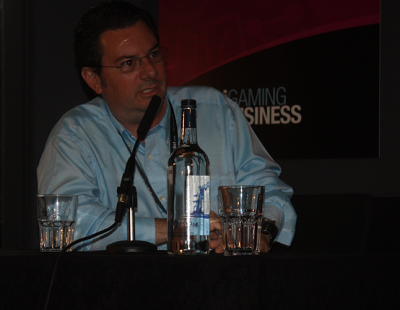 San said that the definitions of social gaming and social gambling are becoming blurry. He noted, for instance, that you can put a value on poker chips if an (unofficial) secondary market appears where individuals sell off their extra poker chips in a social casino title. But Hughes noted the games are closed loops, where you can buy virtual poker chips but cannot officially cash them out. San argued back that no game company has ever done much to shut down unofficial secondary markets.
San said that the definitions of social gaming and social gambling are becoming blurry. He noted, for instance, that you can put a value on poker chips if an (unofficial) secondary market appears where individuals sell off their extra poker chips in a social casino title. But Hughes noted the games are closed loops, where you can buy virtual poker chips but cannot officially cash them out. San argued back that no game company has ever done much to shut down unofficial secondary markets.
Gambling consultant Steve Donoughue (pictured at top of first page, middle) said that it is not correct that developers want to get everyone addicted. San countered that would be easy to conclude if you go to a social-gaming developer conference. Hughes also wouldn’t concede that point on addiction.
Referring to his past releases, San said that the goal in video games was to get players addicted. But that was different because it was a one-time purchase, not an ongoing virtual goods purchase that could be repeated over and over.
The panel did not address the fact that the real-money online gambling organizations compete head on with the social-casino-game makers. The real-money gambling outfits would naturally rather slow down the social-casino-title enterprises.
AI Weekly
The must-read newsletter for AI and Big Data industry written by Khari Johnson, Kyle Wiggers, and Seth Colaner.
Included with VentureBeat Insider and VentureBeat VIP memberships.
Donoughue said that if social efforts are just for fun, then social-casino-game operators should not have to suffer the cost or incompetence of regulatory review. San said that the cost of protecting consumers is actually pretty low. But Donoughue also said that addiction applies to everything, but you don’t have to offer protection to everybody because certain individuals lack self-control.
“These are games, and we do not want to regulate them in the same way we do not regulate the sales of playing cards and plastic poker chips,” Donoughue said. “We need to live in a world where there is an element of self-responsibility. If you play a game that might look like Blackjack, but there is no money coming out, this is a game. This is not gambling.”
San advocated “voluntary consumer protection,” even for non-gambling, non-casino experiences, especially if they have vulnerable players who are prone to addiction.
From the way the panel went, you would have thought that the big bottles of water on the table were more like bottles of vodka. Donoughue told San to “shut up” and stop interrupting. San shot back, “That’s a very good argument.”
Donoughue said that San was “accusing an industry, the social-games industry,” of being malicious about hooking gamers. San said, “I’m not accusing. I’m guaranteeing that is what they do.”
In the gambling world, companies have to allow people to set their own limits. If they don’t want to lose more than 50 pounds (or dollars a month), they should be allowed to set a monthly limit that shuts down their accounts once they exceed the 50 pounds. San said social-gaming companies don’t want to put those limits on people because it might affect profits. One attorney in the audience sided with San, saying that social titles have a huge reach, but no one has bothered to study the issue of addiction using real consumer data.
Tilly said at the close of the discussion that the debate was a draw. Here’s a video of some of the issues discussed at the event, where I was one of the speakers.
The conference organizers paid my way to London, where I gave a speech. Our coverage of the conference remains objective.
VentureBeat's mission is to be a digital town square for technical decision-makers to gain knowledge about transformative enterprise technology and transact. Learn More